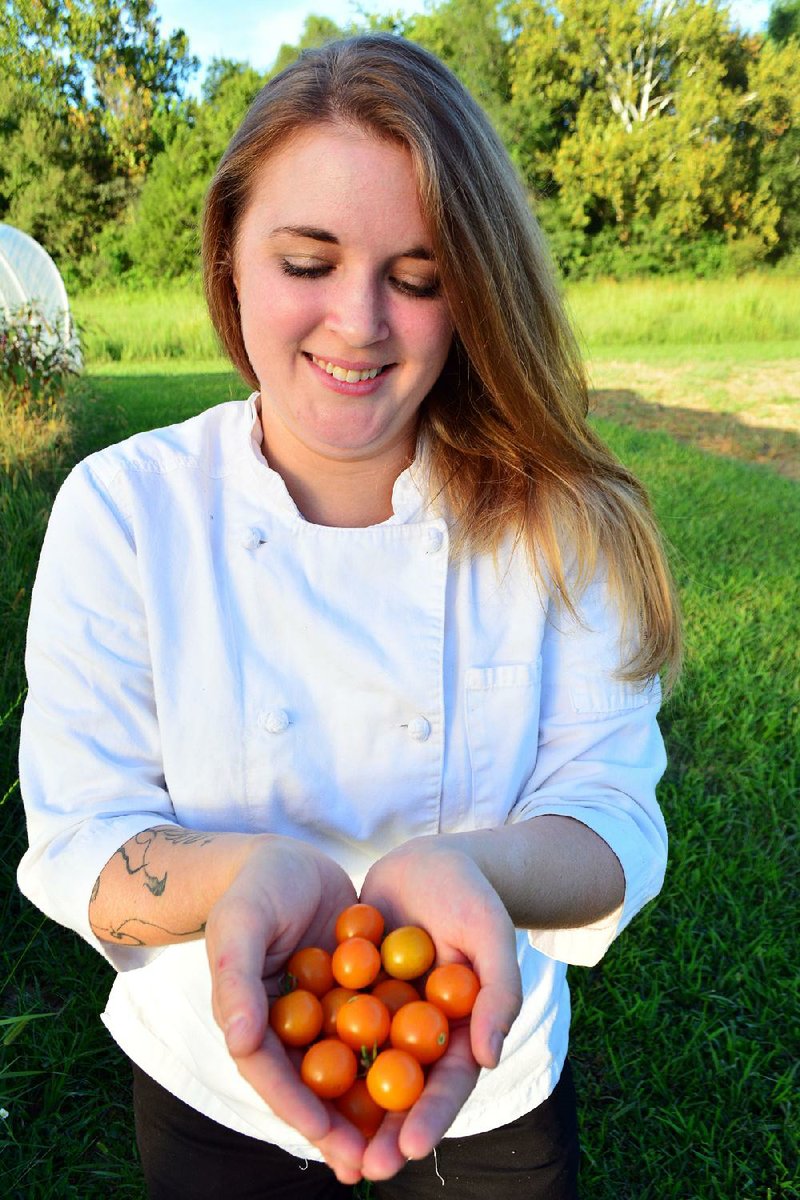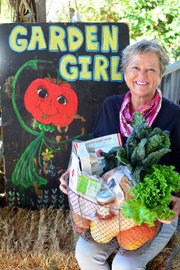BATESVILLE -- Not so long ago, a young Arkansan spent the best part of warm days watching her grandparents pick a bounty of tomatoes, squash, green beans and, with a little luck, strawberries off the vine from their own garden. Nothing said "summertime" like a freshly plucked, gleaming red tomato, dirt rinsed away by a little water from the hose.
A dash of salt and a comfortable seat in the front porch swing were the only additives.
They never wondered where their food came from or what was in it. They didn't talk about "farm to table." They lived it.
Cheryl Anderson, owner of Garden Girl Farm Fresh Produce and More in Batesville, grew up in Desha in a family of small-garden keepers.
"My grannies were excellent farmers. My Granny Hinson would plant bags of pinto beans and grow what we called shelly beans. We used to have them for Sunday dinners. And she loved growing tomatoes, which are not easy to grow," Anderson said.
The world changed, and fewer Arkansans had land or time to grow their own food. The joy of harvesting and then eating produce grown with hard work and love was lost to many. Anderson sees herself as part of a movement that's working hard to revive the love -- by helping her neighbors to "eat local."
After working 20 years in public relations for Domino's pizza, Anderson returned to Arkansas in 2002 with her slate "wide open."
"I always loved farmers markets. As soon as you arrive, you hear laughter, see the beautiful flowers and fresh food, and everyone is happy. I think it's because it puts people close to their food and where it comes from, and that's important to a lot of people," she said.
Anderson wanted to create that kind of community atmosphere, so in 2010 she developed her grandmother's property in Pleasant Plains. She started her first market spot in Pleasant Plains with nothing more than a beach umbrella and two round tables. Preparing the land to grow a variety of produce was a labor of love, but still a labor. It required 17 loads of shale to level the property.
The property sits close above the water table, as she discovered when the bulldozer sank during preparations.
The garden area was fenced in with repurposed telephone poles and web wire. A 132-foot-long fabric tunnel was built in 2012, tall enough for the gardener to walk around inside and tend the rows. It enables Anderson to grow lettuce and cold crops year round and gives her a 30-day jump on growing tomatoes in the spring. She's grateful for her family and friends, who helped build the structure.
"I'm one lucky girl," she said.
A metal statue of "the garden girl," who seems to be diligently tending her plants, has become a landmark in front of Anderson's market. "She never complains and works all the time. There are even photos of her in the Smithsonian," Anderson said.
She recently opened a second market space at 1355 College St. in Batesville. Anderson is a certified natural grower. She sells her own homegrown produce, and also coordinates a "farm share" service for 10 to 12 other local farmers. Farm share is a partnership among farmers and customers who pay in advance of delivery for weekly shares of the season's harvest.
The farm share, announced in February, drew 16 customers, who registered early on so farmers would know how much produce they would need to supply every week for the 18 weeks from May until the end of August.
Anderson works with the Grass Roots Farmers' Cooperative to provide grass-fed and finished meats from small, family-owned farms. "All of the farmers with Grass Roots share the same raising procedures. There are no GMOs, no antibiotics and no nitrates used in raising the livestock. All the meat is USDA processed," Anderson said.
"We provide a multitude of whatever is in season, and it's been good for everyone involved. It builds unity and makes everyone feel like they're doing the right thing by providing healthy, clean food," Anderson said.
...
Elsewhere in Batesville, another member of the movement is at work in a commercial kitchen.
Chef Sidney Jones is doing what she can at The Field and The Fork Catering Co. to promote the use of locally grown, in-season produce.
A Batesville native, Jones studied art at the University of Central Arkansas before she attended L'Academie de Cuisine in Maryland, named by the independent website thebestschools.org as one of the Top 10 culinary schools in the country. Jones worked at several fine dining restaurants in the District of Columbia and taught French cooking techniques at her alma mater before returning to her hometown with her fiance, Randy Warn, with the express intent of bringing a farm-to-table dining experience to north central Arkansas.
"I want to bring the worlds of fine dining and naturally grown ingredients from local farmers together. I like to make food that highlights the ingredients, and when you can get those ingredients from a farm 10 minutes away, there's nothing better," Jones said.
Jones and Warn are a culinary tag team.
The couple met in culinary school and now run The Field and The Fork, which delivers a weekly menu of meals featuring local ingredients directly to customers and also caters events. Like Anderson, Jones and Warn work with the Grass Roots Farmers' Cooperative to get grass-fed meats to use in their meals.
Warn tends the couple's garden and also works with farmers Brandon Gordon and Lonnie Clark. What got him interested in farm-to-table business? A meal he ate at one of chef Dan Barber's Blue Hill restaurants in New York.
The 34-course experience featured products grown on a farm adjacent to the restaurant ranging from a sampling of raw vegetables to a frankfurter made with beet scraps from the restaurant's juice bar.
"The meal was an exploration in the versatility of many ingredients we take for granted and just how much more delicious they can be when they are raised in a clean, sustainable way. It was the most magical dining and agriculture experience I have ever had. It is the pinnacle of farm-to-table," Warn said. "After that meal, there was no turning back."
Warn said the couple felt a pull to bring "local food" back to north central Arkansas.
"We could have gone to California or Colorado, but it's already so ingrained in the culture in those areas that it's what they expect," Warn said. "It's worth the effort to come here and provide education about the benefits of locally grown, natural foods and spark that conversation. Now more than ever it's important to know where our food comes from and to have an appreciation for those who grow it.
"It's not an easy profession."
Warn said that because certified naturally grown and organic farms cannot utilize chemicals to help in labor intensive areas of farming such as weed control, farmers must resort to hands-on techniques. More labor means more cost to raise produce, plus the added expense of organic certification.
"The overall cost of a naturally grown tomato can be double that of a conventionally grown tomato," Warn said. "Unfortunately that cost discrepancy is where small farmers eventually find the biggest challenge. People have to buy your produce over the other guys'. There isn't an active resistance to the farm-to-table movement in our country, but when people in America tighten their budgets, usually the first thing to go is expensive groceries.
"Most Americans would rather buy the cheapest food that they can so that they have money for other living expenses or hobbies. This cultural norm is a huge challenge to those of us who see good natural food as an investment in our own bodies and longevity."
However, Warn and Jones said that the pleasure they gain from promoting locally grown, organic produce outweighs the challenges. "I love it when I get someone to try a food they say they hate," Jones says. "During the Southern Food Festival, I had a customer that said he didn't like fried green tomatoes, but I got him to try one. In a few minutes, he was bringing a friend over telling him he had to try one."
To educate the next generation about locally grown produce, Anderson speaks at area schools about the process of growing vegetables from seed to plant.
"The kids love it. It's wonderful to see their interest. I have teachers tell me that when they do school garden projects, they have no discipline problems. The students forget their difference and all work together.
RELATED ARTICLE
http://www.arkansas…">Farm to Table dinner is set
"I want to do whatever I can to keep that interest and encourage them to share it with their friends. That's our future."
ActiveStyle on 09/11/2017



